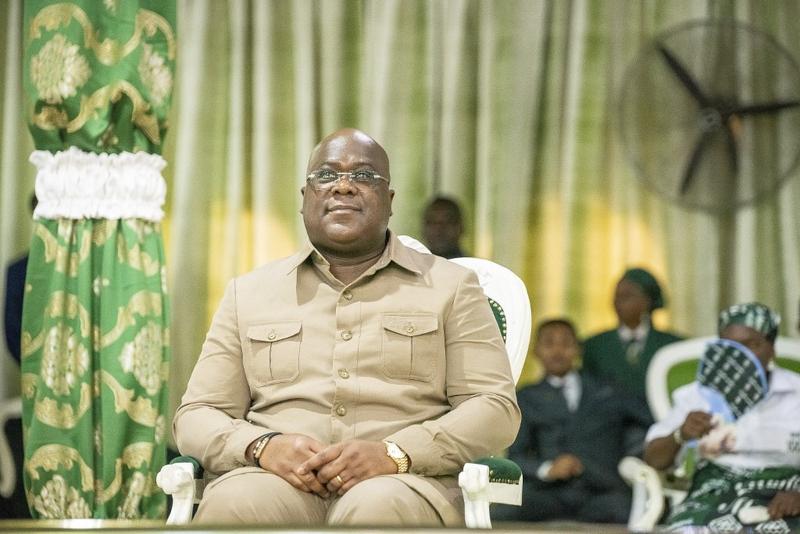 Democratic Republic of Congo President Felix Tshisekedi (center) looks on at the International Kimbanguist Church Headquarters in Nkamba, DRC, during the church's 100th anniversary on April 6, 2021. (ARSENE MPIANA / AFP)
Democratic Republic of Congo President Felix Tshisekedi (center) looks on at the International Kimbanguist Church Headquarters in Nkamba, DRC, during the church's 100th anniversary on April 6, 2021. (ARSENE MPIANA / AFP)
KINSHASA - Democratic Republic of Congo’s prime minister announced a new Cabinet on Monday, completing a government overhaul by President Felix Tshisekedi that strengthens his hold on power.
The new government is a further blow to Tshisekedi’s predecessor and former coalition partner, Joseph Kabila, who stepped down in January 2019 but maintained control of some ministries, the legislature, judiciary and security services.
Since announcing the end of their alliance in December, President Felix Tshisekedi has succeeded in replacing Joseph Kabila’s allies at the head of the parliament and senate, as well as the prime minister
Since announcing the end of their alliance in December, Tshisekedi has succeeded in replacing Kabila’s allies at the head of the parliament and senate, as well as the prime minister.
ALSO READ: Congo government announced 8 months after Tshisekedi won vote
Prime Minister Jean-Michel Sama Lukonde, himself appointed in February, named economist Nicolas Kazadi as finance minister, former civil society activist Antoinette N’Samba Kalambayi as mining minister and retired general Daniel Aselo Okito as interior minister, said Tshisekedi’s spokesman Kasongo Mwema.
More than a quarter of the 56-member Cabinet are under 40 years old, and only 10 have been re-appointed, Lukonde told journalists after the announcement. The presence of many lesser-known figures suggests a desire for control from above, political analysts said.
“The ministerial appointments likely indicate a top-heavy policymaking model,” said Indigo Ellis from Africa Matters, a risk consultancy firm.
The government includes allies of Moise Katumbi and Jean-Piere Bemba, two political heavyweights whose support Tshisekedi relied upon to unseat Kabila loyalists.
READ MORE: Congo president's chief of staff denies graft charges as trial begins
Katumbi and Bemba remain outside government. They may become challengers when Tshisekedi seeks to renew his mandate in 2023.
“Both will therefore retain a significant level of autonomy and if necessary distance themselves from government policy,” said Alexandre Raymakers, senior Africa analyst at Verisk Maplecroft.
“Their allegiance to the president is in many ways circumstantial, and dictated by conditions or a desire to curtail Kabila’s influence and power. Not exactly the most solid foundations for a reformist government.”


